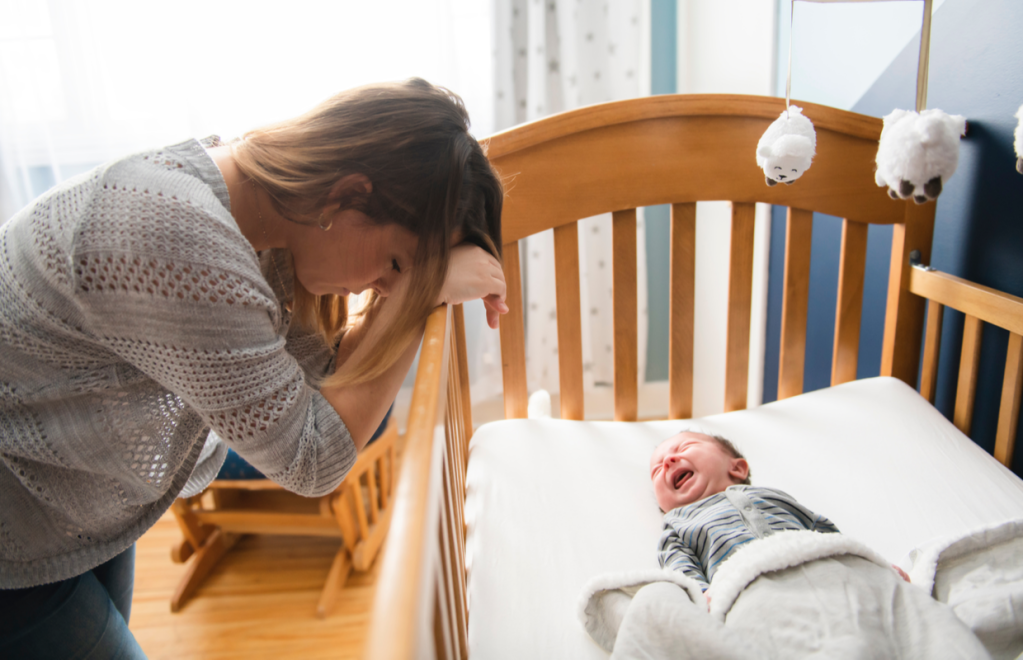What is postnatal depression (PND)?
Discover the causes and symptoms of postnatal depression (PND), plus some top tips on how to help yourself and others who are struggling.

Medical doctor Radha Modgil and experts from the Mental Health Foundation are here to shine a light on postnatal depression (PND), offering reassurance, exposing potential causes and symptoms, and sharing tips on how we can help ourselves and others.
Bringing new life into the world can be a joyful, life-affirming event for many couples. And as you settle into a routine with your baby, the joy continues – albeit alongside the challenges of night feeds and a lack of sleep!
However, for some new parents, the early stages of your baby’s life can be plagued by feelings of sadness and depression. What’s more, many struggle to come to terms with these feelings, often experiencing shame and guilt for not feeling on top of the world about their longed-for bundle of joy.
Lots of parents find things tough, but for those suffering from postnatal depression, life with a new baby can be extremely difficult. Better understanding of this condition will allow us to spot the signs when we, or someone we love, needs help.

What is postnatal depression (PND)?
‘Postnatal depression is a form of depression that is experienced by parents after having a baby. It affects around 10-15 in every 100 women, but many people don’t realise it can affect fathers and partners, too, and can emerge at any time during the first year after having a baby,’ says Dr Modgil.
‘Postnatal depression is often mistaken for the common stage of new motherhood known as “the baby blues. More than half of new mums experience a feeling of emotional overwhelm for a couple of weeks after having a baby. Other symptoms of the baby blues include feeling anxious, irritable and irrational.
‘While these symptoms can be concerning – particularly as you may have assumed time with your new baby would be all smiles and cuddles – it’s completely normal to feel this way and, unlike postnatal depression, symptoms will normally subside within a couple of weeks, with self-care and support from loved ones.
‘If you experience feelings of sadness and low mood for more than the first couple of weeks, and the feelings are impacting the way you live your life, it may be a sign of postnatal depression. With the right support, however, most people make a full recovery.’
What causes postnatal depression?
‘There’s no concrete cause behind postnatal depression, but there are a few factors which may mean you are more predisposed to it,’ says Dr Modgil. ‘These include a history of mental illness and depression, recent stressful events, and having no support network around you.
‘For some people, however, none of these factors maybe relevant – having a baby is a life-changing event and sometimes this alone can trigger depression.’
What are the signs of postnatal depression (PND)?
‘Many people don’t recognise they have postnatal depression because it can develop gradually,’ says Dr Modgil. Here are some of the most common signs of postnatal depression to take note of:
- A persistent feeling of sadness and low mood
- A lack of enjoyment and loss of interest in the wider world
- A lack of energy and feeling tired all the time
- Trouble sleeping at night
- Difficulty bonding with your baby
- Withdrawing from contact with other people
- Problems concentrating and making decisions
- A loss of interest in your baby, and negative thoughts or anxiety regarding them

3 ways to help yourself or others with postnatal depression:
‘Postnatal depression can be lonely, distressing and frightening, but support and effective treatments are readily available,’ says Dr Modgil. These include:
1. Self-help
Talk to your family and friends about your feelings and discuss how they can support you. Make time for yourself to do things you enjoy. Although it can be hard with a new baby, get as much rest as possible, and make sure you’re eating well.
2. Psychological therapy
Your GP may be able to recommend a self-help course or refer you for talking therapies, such as cognitive behavioural therapy (CBT).
3. Antidepressants
These may be recommended if your depression is more severe, or if other treatments have failed to help. Your doctor can prescribe a medicine that’s safe to take while breastfeeding.
By Larissa Chapman (Photos: Shutterstock)









